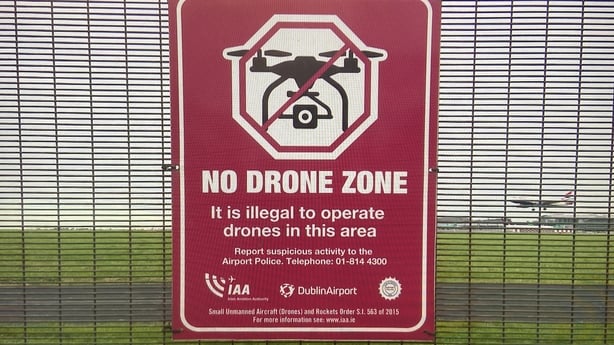The chief executive of Dublin Airport operator, daa, has called for a State defence system to take down drones that disrupt flights at airports.
Some flights were cancelled at Dublin Airport after drones were sighted on the airfield on Friday, Saturday and Monday over concerns they could damage planes.
It is illegal to fly drones within 5km of the airport and investigations by daa verified that there were drones in use on Saturday and Monday, but not on Friday.
Daa Chief Executive Kenny Jacobs said he met the Irish Aviation Authority, Minister for Transport Eamon Ryan and Minister for State Jack Chambers last night to discuss concerns.
Speaking on RTÉ's Morning Ireland, he said a State defence system is needed to address the problem as recent events show how easy it is for an airport to be shut down.
He said that there will be further meetings with ministers to look at options available to prevent the problem from happening again.
We need your consent to load this rte-player contentWe use rte-player to manage extra content that can set cookies on your device and collect data about your activity. Please review their details and accept them to load the content.Manage Preferences
"There are a number of things that can be done to prevent this," he said. "This is not a matter for just Dublin Airport … next weekend this could happen at Shannon Airport.
"It could also happen over the Aviva Stadium while Ireland are playing France, and that match could be disrupted because of drones.
"So, I think this is a State-wide issue. Dublin Airport has a drone detection system. We don't have a system to stop and take down drones. That's something totally different.
"Last weekend, regrettably, there were 16 disruptions."

There is a robust process with gardaí, air traffic control and the regulator, the IAA, on how to manage the situation from a safety point of view to ensure that passengers are safe and "that's the robust procedure that is in is in place", he said.
Mr Jacobs said the State can take other actions and gave the example of Gatwick Airport in London, which had problems with drones in 2018 that brought the airport to a standstill.
He said: "Since then, the UK government has implemented a drone counter-measure defence system that's not operated by Gatwick Airport.
"It's not operated by Heathrow, it's actually operated by the Metropolitan Police in London, so that is a defence system that allows the police - in the case of London - to take control of a drone, send it back where it came from, jam the signal, or they can bring it down if they have to."
'This is not a matter for just Dublin Airport ... next weekend this could happen at Shannon Airport. It could also happen over the Aviva Stadium while Ireland are playing France - that match could be disrupted because of drones' - DAA Chief Kenny Jacobs | https://t.co/tZpp1UDuOw pic.twitter.com/279PNCq1qm
— RTÉ News (@rtenews) February 8, 2023
Mr Jacobs said that daa has given recommendations to ministers.
"I think this goes beyond Dublin Airport. It's not a matter for us to sort this out. I think it's a State-wide issue, probably more defence and justice than it is transport. So, we've given our recommendations on what should be done."
He said that any information that daa gets from detecting the drones is shared with gardaí, who are then responsible for finding those responsible and bringing prosecutions.
"I think they have very good data in terms of where the drones could be coming from, and they're investigating that.
"The maximum sentence somebody can get, and I think people need to be aware of this, is up to seven years. Again, I would say in the UK they've increased that to a maximum life sentence for people that are flying drones over an airfield.
"So, I think getting the system in place to take drones down is something that would be good for the State, and increasing the sentencing so that if people are breaking the law, and they are breaking the law if they fly a drone near Dublin Airport or any airport, there needs to be draconian sentencing in place."
He said that he cannot guarantee that the closure of the airport will not happen again.

